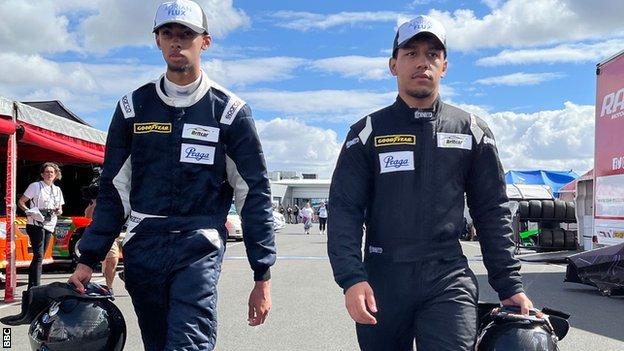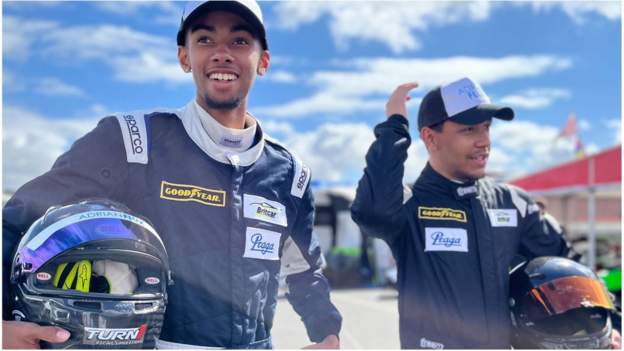Last updated on .From the section Formula 1
| Watch We Are England- Born to Race on BBC iPlayer. Episode two airs on Mon 9 January, 20:00 GMT. |
Ruben Stanislaus and Lewis Appiagyei are both young, black British drivers with ambitions of reaching Formula 1.
A new two-part series on BBC iPlayer, We Are England: Born to Race, follows both young men and their families on their journeys to try and become professional racers, including meeting Formula 1’s first and only black driver, Lewis Hamilton.
Stanislaus, 18 started karting at the age of four. Appiagyei, 19, picked up racing when he was five. They first met one another in 2011 at Buckmore Park Karting, in Kent – the same circuit where their hero, Lewis Hamilton trained as a child.
Between them, the two drivers have represented their country, won over 400 trophies and broken track records at Buckmore Park. Their goal is to make the transition from karting to professional racing and eventually break into Formula 1. Their future success may rely not just on talent, but also on continuing to secure sponsorship and support.
Both young men have made strides in the world of professional racing. Stanislaus has secured place on a driver development programme, whilst Appiagyei has received numerous opportunities, including to test F3 cars.
But both have told the BBC that they have faced barriers in the sport because of their ethnicity. During the series, both young men explore the lack of diversity within motorsport.
We also get an insight into the struggles their families face in order to try and finance what is a very expensive career path to pursue.
‘I was disqualified for being too quick’
In episode one, Stanislaus describes meeting his friend Appiagyei for the first time at Buckmore Park, aged seven.
“Back then, seeing another driver of colour was very rare,” he says. “To see someone else that looked like me, naturally you work with the person and understand where they come from.”
During the documentary, Stanislaus describes situations where he feels that he has been discriminated against because of his skin colour.
“When I was karting, there were even some races I was disqualified from for being too quick,” he explains. “They accused me of cheating, checked the car, checked everything. Everything was clean. We never cheated – we even had a slower car than most people, but I feel personally it was to do with my race. I can’t think of any other reason.”
Stanislaus’ dad Steve, 58, believes his son’s skin colour means, he has to be “twice as good” as his white counterparts, in order to succeed.
“If the people in powerful positions are not like you, it’s going to be harder to impress them,” he says in the series.
Meanwhile, Appiagyei says that while he has never faced direct discrimination, he does believe there is “a lack of opportunity” in motorsport, for “people that look like me”.
Meeting Hamilton
During episode two, both young men are invited to meet their idol, Lewis Hamilton, at Mercedes’ headquarters.
Hamilton, 37, is the first and only black driver to ever race in Formula 1. In a conversation with Stanislaus and Appiagyei, the seven-time world champion shares some of his experiences as a black athlete in motorsport.
Hamilton says that “being the only person of colour on the track” was his biggest challenge when starting out in the sport.
In 2019, the veteran driver set up the Hamilton Commission, with the aim to improve representation of black people in motorsport.
Research by the commission in July 2021 suggested that the proportion of black people in Formula 1 is less than 1%.
“There’s a lack of diversity through big, big companies, organisations, from the top, all the way down to the bottom and there’s very little black leadership, so I put this commission together to try and find out what are the barriers for underserved communities getting into this sport,” says Hamilton.
“Why are they not applying to jobs, why are they not being fed through the university? Also, people particularly from African and Caribbean heritage, their parents – because they don’t see anybody here that looks like them, they don’t think, ‘that could be me’.”
Beyond representation, Hamilton suggests that finance could be a barrier to entry for some communities.
“The problem with our sport is that it is expensive,” he adds.
The cost of competing in motorsport
Competing at karting level can cost in the tens of thousands of pounds and the costs rise at professional level.
Stanislaus’ dad, Steve, says that the odds are stacked against those with less money.
“It’s not a level playing field, full stop,” he says. “You look at the front of the grid – it’s normally the ones with the most amount of money and backing.”

“You can have all the talent in the world, but if you haven’t got any money, you’re not going to make it,” says Appiagyei.
In order to race professionally, both young men have to obtain a professional race driver’s licence. As part of that process, during the film, they undertake a training day at Silverstone, as well as several other races in professional cars, in order to obtain the required eight different signatures. It costs their families £8,750 each.
Stanislaus’ mum, Sophie, describes juggling two jobs in order to support her son. “We’ve covered everything, but now, it’s gone to another level,” she says.
Similarly, Appiagyei’s mum, Sabine talks about the stress that these finances put on the whole family.
She says: “The spend is so large, you’re forever thinking, ‘how can I get more money, how can I save more on other things’?”
In order to get a spot in a professional race at Donington Park, they must raise £20,000.
As Steve says, in episode one, “The money needs to be found to drive the car. Without that, the career just comes to a standstill.”
